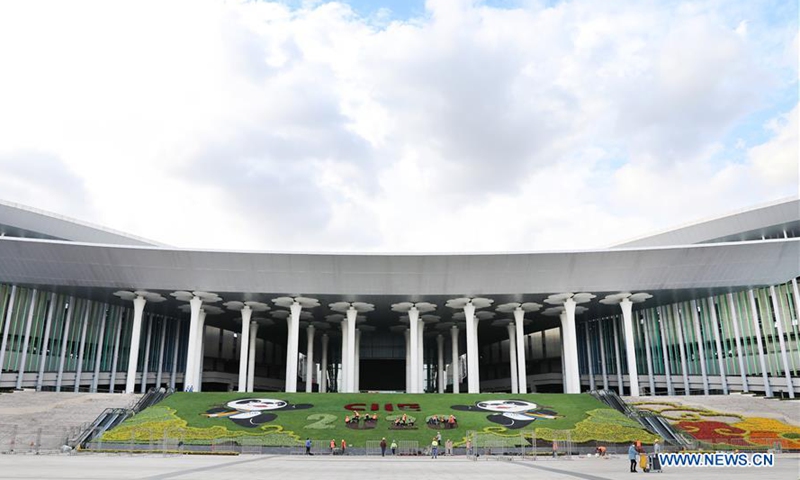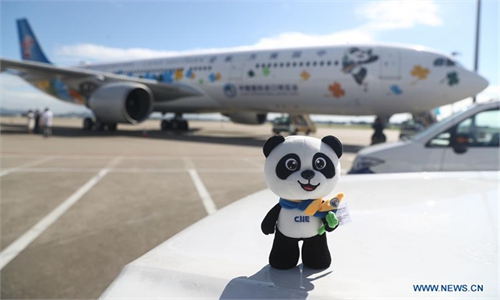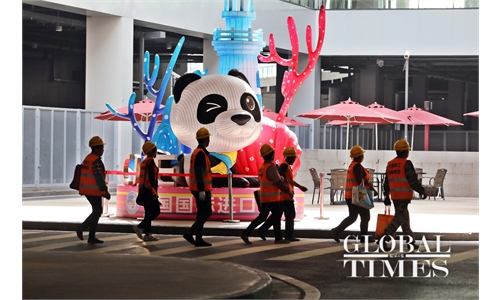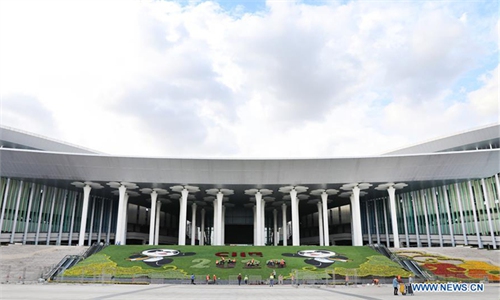Australian firms eager to attend CIIE
Morrison administration’s hostility causes harm to business relations

Gardeners prepare flower decorations for the upcoming 3rd China International Import Expo (CIIE) at a square of the National Exhibition and Convention Center in Shanghai, east China, Oct. 14, 2020. The 3rd CIIE will be held from Nov. 5 to 10 in Shanghai. (Xinhua/Fang Zhe)
About 200 Australian firms will attend the 3rd China International Import Expo (CIIE) in Shanghai in November, seeking to expand exports to China despite the Western media's hyping of a "trade war" between the two countries caused by worsening diplomatic ties resulting from the Morrison government's growing hostility toward China.
Australian companies from a range of sectors including food, agriculture, medicine and trade will exhibit products and services at the CIIE, with the amount growing 20 percent year-on-year, the Australian Trade and Investment Commission (Austrade) said in a statement.
For the first time, Australian seafood exporters such as Geraldton Fishermen's Cooperative, Austral and Two Oceans Abalones will attend the expo, looking for export cooperation opportunities for their high-end products like Australian lobster.
In order to help Australian companies better connect with their Chinese cooperation partners during the global pandemic, Austrade launched a mini program on Tencent's social media platform WeChat to showcase Australian companies, products and technologies.
Australia attaches importance to strengthening economic and trade relations with China, Austrade said, noting that it hopes to generate mutual benefits to companies from both countries through a variety of cooperation mechanisms while introducing premium Australian products and services to Chinese consumers.
"With growing consumer confidence [in China] as evidenced by the 4.9-percent growth rate in the third quarter, there are opportunities for sectors where there is traditionally strong demand for Australian products and services," Nick Coyle, CEO and executive director of AustCham in Beijing, told the Global Times on Tuesday.
"This of course benefits the Australian economy as it recovers gradually," he said, noting that the CIIE offers a great opportunity for Australian firms to re-engage with their existing customers and of course develop potential customers in China.
The active participation by such a great number of Australian companies is a slap in the face of Western media outlets that have recently hyped the idea that China is launching a "shadow trade war" against Australia by suspending imports of Australian cotton and coal.
The Morrison administration's increasing animosity toward China has negatively impacted bilateral economic and trade ties with China, but the complementary trade relationship - which is still important for both economies - can't be damaged easily, said Han Feng, a research fellow with the National Institute of International Strategy at the Chinese Academy of Social Sciences.
"It's Western media's speculation that there is a 'shadow trade war' just because China's imports of cotton from Australia have reportedly been reduced," he told the Global Times on Tuesday, noting that China's imports are affected by domestic demand and the global economic contraction.
Yu Lei, chief research fellow at the research center for Pacific island countries at Liaocheng University in East China's Shandong Province, told the Global Times on Tuesday that China has not closed its door to Australian products.
"China is making industry adjustments in keeping to the market rules, while the Australian side should show goodwill to improve bilateral relations," he said, noting that Australian companies' active attendance at the CIIE is out of their real need for business, as well as an expression of their dissatisfaction about Australia's China policy.
Affected by the pandemic and global economic slump, Australia's economy dropped 7 percent in the second quarter, the largest quarterly contraction on record, according to data released by the Australian Bureau of Statistics in September.
Coyle said that the complementarity of the economies will be the major driver of China-Australia bilateral trade in the future. "As we recover from COVID-19, we'd hope to see strong people-to-people flow again," he said, noting that health services and medical technology offer great opportunities for growth.




